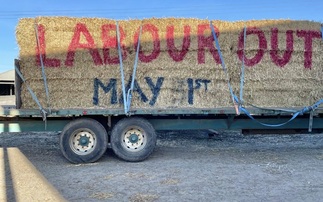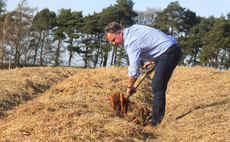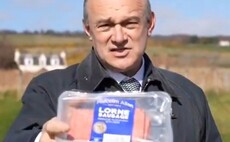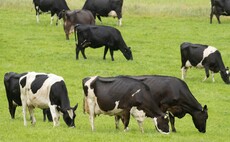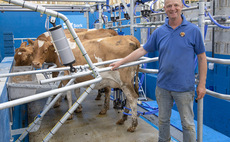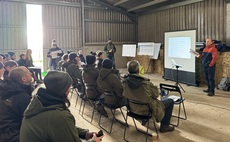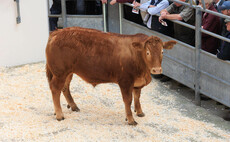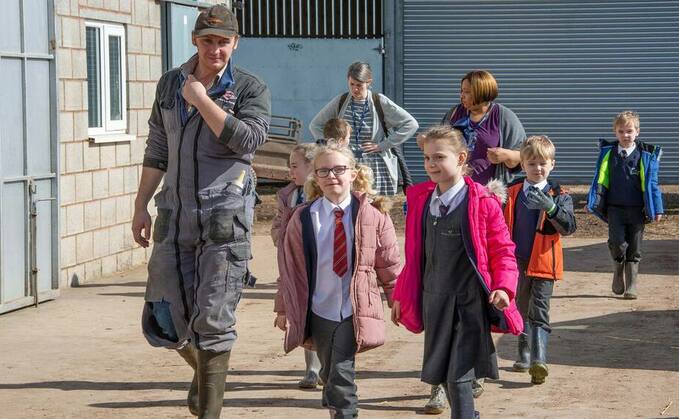
Farming can plug the science, technology, engineering and mathematics (STEM) skills gap, helping inspire children to take up crucial roles and careers through the lens of food production.
That was the key finding of a new NFU report, Inspiring STEM Learning Through Agriculture, which called on the Government to take agriculture seriously as a vehicle to deliver STEM education in light of the lack of STEM graduates and people with the skills needed to create a productive and sustainable future Britain.
A YouGov survey highlighted a skills gap in careers based around STEM subjects, with one fifth of teacher respondents stating that they struggled to teach any science during the week.
NFU president Minette Batters said: "Government has the opportunity to recognise and promote the role that farming can play in teaching vital STEM subjects in an exciting and innovative way that benefits the next generation.
"We ask the Government to make sure agriculture is pushed as a way of doing this. It would make a huge difference for the pupils, the school and wider society.
"By engaging children with agriculture at an early age and showing them that science, technology, engineering and maths play crucial roles in the sector, we can inspire future generations of STEM professionals.
"This will have benefits for other industries and the wider economy, as well as inspiring interest in working in Britain’s all-important food industry."
Joshua Payne, NFU chief education manager, added agriculture was a subject every student can relate to since everyone eats food everyday that is produced on farms.
But he added STEM was not just about science or technology, or engineering or maths.
“It is about all of them together and implementing them in situations that will teach children about life outside the classroom,” he said.
"It is about providing a new way for them to learn important skills, in a way that does not seem like learning.
"It is about challenging children to think about the future and their part in it.
"Using agriculture is a great way of doing this – and the benefits will be felt from field to fork, and beyond."
Reflecting on the success of using agriculture to teach STEM subjects, Claire Hofer, science co-ordinator at Brompton Westbrook Primary School in Gillingham, said: “The NFU Education programme has been great for developing the children’s science capital and helping them to understand that science is not just something that happens in a science lesson but it is everywhere in the world around them.
“This project has helped them to understand and appreciate the science involved in growing their food and caring for their own plants, as well as considering costing and manufacturing. It has been a fantastic real-life project for the whole school to get their teeth into.”
Inspiring the next generation of agricultural engineers
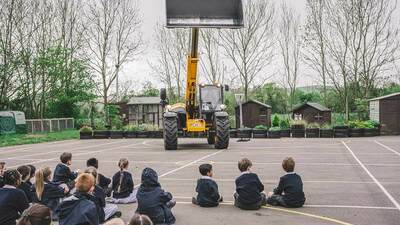
In a bid to inspire a future workforce, companies within the agricultural engineering sector have been proactively promoting career opportunities to children.
JCB recently demonstrated how its Loadall 526S can be used to load wheat into lorries for cereal production on a recent visit to a Bedfordshire primary school.
The company also invests heavily in its graduate and apprenticeship recruitment programme.
Neil Fowkes, early career talent manager at JCB, said the machinery manufacturer actively looks for candidates with an agricultural background.
"History shows us that great knowledge in this area produces the best agricultural engineers," Mr Fowkes said.
"There are limitless opportunities with careers at JCB and anyone entering the business with an interest in agriculture could find themselves working many areas, including sales, design, production and marketing."
Promotion
But Charles Nicklin, chief executive of the Institute of Agricultural Engineers (IAgrE), said promotion of the industry needed to be directed at school leavers as well as those already embarking on further and higher education.
"I remember my careers adviser looking blankly at me when I said I wanted to work in tractors and engineering, I think they thought I just wanted to be a farmer and the conversation ended very quickly," Mr Nicklin said.
"Luckily for me, I had already got in my head what I wanted to do."
Mr Nicklin added he had spent a lot of time talking to students to give them an insight into his career and said more school visits from tractor dealerships and manufacturers were necessary to help promote jobs in the sector.
"The challenge is that it is demanding on time, but it is needed to help in the long term," he said.
"We start children off well at primary school talking about farm animals, tractors and diggers, but then it seems to get lost in secondary school.
"Farm machinery and animals are a great way to engage people, it is very visible and easy to talk about."
An explosion of technology within the sector this decade is a further reason why young people need to come through to support it, Mr Nicklin said.
"We should use this exciting technology to showcase the types of roles people can do in ag and its allied industries," he added.
"Everyone should be interested where their food comes from, there is so much focus on it from the public, sustainable food production is so important. We need to make children more aware of agriculture and the types of roles available to school leavers.
"The UK has some really fantastic research going on, truly world leading technology, and it could not be more important for the industry from a sustainability or monetary perspective post-Brexit.
"One thing is for sure, we need to eat a few times a day, so we need agriculture, and agriculture does not work very well without engineering.
"And, if we think we are going to be carbon neutral in the next decade or so, well it is engineers and scientist that will need to make it happen."
Virtual learning pairs classrooms and farmyards
Virtual learning pairs classrooms and farmyards
Acting as a shop window for British food and farming, Linking Environment and Farming's (Leaf) Farmer Time initiative has successful paired more than 700 schools with farmers to date, harnessing digital communication to inspire, engage and educate young people about the diverse agricultural industry.
Founded by Tom Martin, of Village Farm, Cambridgeshire, the scheme has enabled children to talk 'live' to their matched farmer from their classroom.
"The beauty of Farmer Time has always been its simplicity and in a digital world the opportunity to connect in this way is so important," Tabitha Salisbury, Farmer Time coordinator, said.
"Farming can relate to nearly all subjects and farmers often work within the current curriculum, focusing on what the children are learning about at that time.
"They bring lessons from the farm and apply it to the education curriculum, bringing the lessons to life in practical applications."
Despite the Covid-19 pandemic seeing mass school closures, the sessions continued, either pre-recorded or an alternative for children of key workers still going into schools.
"Farmer Time offers the first step for many young people to begin to have an understanding and appreciation of the agricultural industry," Ms Salisbury added.
"It is vitally important, for those who are unable to access the natural environment, which might be a distant concept for those in inner-city London, that we provide a window of opportunity for them to understand a little more about.
"We know there is a disconnect between the wider population and the agricultural sector, not just farming, but the wider industry as a whole covering all aspects of food, farming and rural life.
"We are speaking to the consumers of tomorrow, who will be making their own independent food choices in years to come, but will also be our future decision makers, politicians, and agricultural workforce.
"The pace in which the agricultural sector is developing is phenomenal, and it is great to see the realisation from these young people that there is so much more to agriculture than ‘physical farming."
Visit Farmer Time for more information and to get involved.
What can the industry to open itself up to new entrants and young people?
By Emily Ashworth
George Dunn, chief executive, Tenant Farmers Association
"For most individuals who want to be farmers in their own account, but come from non-farming backgrounds, agricultural tenancies provide the main opportunity for routes into the industry. Whilst share farming, share partnerships, and contract farming arrangements are all helpful at the margin, it is only within the security of an agricultural tenancy that farm businesses without access to owned land can become established, remain sustainable, progress and improve. Of course, prior to stepping into their tenancies it will be vitally important for these new entrant farmers to have gained necessary experience before taking on their own businesses."
Danny Johnson, commercial director, ABN
"Farms are businesses. With the challenges of labour, technology and volatile market conditions the skill base needed to be successful in the modern day is broad, complex and constantly evolving. It is for these reasons that we partnered with the NFU to set up the Poultry Industry Programme (PIP).
Support structures providing professional networks and formal training for farmers remain limited, but the programme aims to develop a base of core skills including people management, negotiation, business planning and lobbying. As a programme committee we work hard to review content to ‘keep it current' and address changing trends - such as the growing importance of PR and Marketing in the battle to promote the credence attributes of our high-quality British produce.
I have worked in agriculture for over 20 years but do not come from a farming background. ABN is part of ABF (Associated British Foods) and as an ABF employee my career has included working within various forms of agriculture, from horticulture to sugar beet, and now the meat sector.
I firmly believe that once you get involved in agriculture, at whatever level, you build an emotional bond with it unlike any other sector. We need to take this opportunity to provide paths and opportunities for people from a diverse range of backgrounds to join us and make that connection."
LEAF Open Farm Sunday
LEAF Open Farm Sunday not only shares the important story of farm to fork with consumers but is a way to sell the career to your future employees.
John Scott of Fearn Farm in Ross-shire, Scotland, who actively looks to recruit young people into the industry through experience on his farm, said: "As a progressive, demanding and increasingly digital industry we need to attract bright minds to want to be part of agriculture and there's no more powerful way than bringing them face to face with the industry and future employers on farm.
"The perception can be that farming is low paid manual labour and bringing young people on farm to events like LOFS can dispel this myth and showcase how farms need scientific minds, business strategy and logical thinking."
To read these blogs in full go to fginsight.com/careers.
















